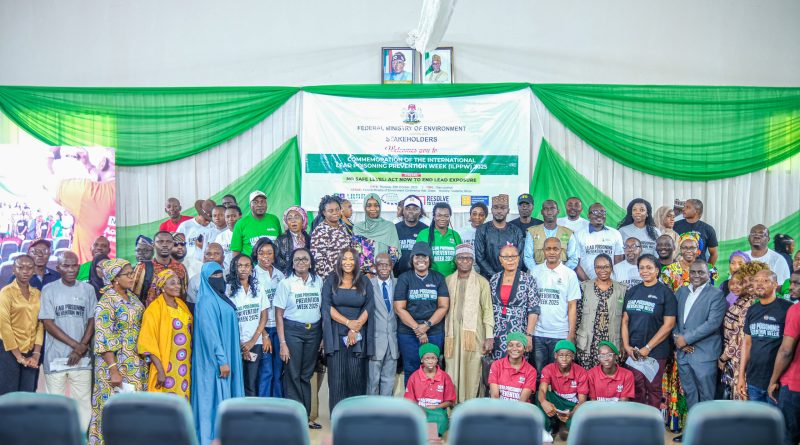Many Nigerians still at risk of Lead Poisoning – Environment minister
The Minister of Environment, Balarabe Lawal, has raised concerns that many Nigerians, especially children and pregnant women, remain at risk of lead poisoning despite ongoing government efforts to tackle the problem.
Mr Lawal, who was represented by the Ministry’s Director of Pollution Control and Environmental Health, Bahijjahtu Abubakar, made this known at the 2025 International Lead Poisoning Prevention Week (ILPPW) held at the Federal Ministry of Environment, Abuja, on Thursday.
The event is themed “No Safe Level: Act Now to End Lead Exposure.”
Lead, a toxic metal found in the earth’s crust, is used in products such as paints, batteries, and cosmetics. Its exposure through air, dust, soil, water, or food can cause severe and irreversible health damage.
According to the World Health Organisation (WHO), children are particularly vulnerable because their developing bodies absorb lead more easily.
ILPPW takes place annually in the third week of October. WHO says the aim is to draw attention to the health impacts of lead exposure, highlight efforts by countries and partners to prevent childhood lead exposure, and accelerate efforts to phase out the use of lead in paint.
Dangers of Lead
The minister said that despite being one of the world’s most preventable environmental health problems, lead poisoning continues to affect millions of people globally, especially children under five.
“Unfortunately, many Nigerians — particularly in rural and mining communities — continue to face these dangers from contaminated soils, unsafe mining and recycling activities, lead-based paints, cosmetics, and other consumer products,” he said.
Mr Lawal described lead poisoning as “a devastating threat to human health” that causes irreversible neurological damage, learning disabilities, behavioural disorders, anaemia, and reduced IQ in children.
He added that adults exposed to lead may suffer hypertension, kidney damage, and reproductive problems, while pregnant women face increased risks of miscarriage and premature birth.
He noted that the ILPPW allows Nigeria to take stock of its progress and strengthen partnerships toward a lead-free environment.
“This event is not only a commemoration but a call to national reflection and renewed commitment to safeguard the health of our people, particularly our children, from the devastating effects of lead exposure,” he said.
Nigeria’s progress
The minister recalled that Nigeria’s journey to addressing lead poisoning began after the 2010 Zamfara outbreak, which claimed hundreds of children’s lives.
Following the tragedy, the government carried out remediation work in Zamfara, Niger, and Kaduna States.
“These efforts have restored safer living conditions for affected communities and provided valuable lessons for managing contaminated sites nationwide,” he said.
Mr Lawal added that the Federal Ministry of Environment, in collaboration with partners, has taken several measures, including developing and enforcing standards to regulate lead content in paints and related products, as well as cleaning up contaminated mining communities and training local miners to adopt safer practices.
The government is also partnering with WHO, UNEP, UNICEF, and non-governmental organisations like Pure Earth and Resolve to Save Lives for data collection and public awareness, and running nationwide education campaigns on the dangers of lead in paints, toys, batteries, and cosmetics.
New interventions
The minister said the government is implementing a National Lead-Free Nigeria Initiative, aimed at phasing out lead-based products by 2030.
The initiative will strengthen collaboration with regulatory bodies like the National Environmental Standards and Regulations Enforcement Agency (NESREA) and the Standards Organisation of Nigeria (SON) to enforce compliance.
Other parts of the plan include promoting cleaner mining technologies, closing abandoned pits, and supporting biotechnological rehabilitation of degraded mining sites.
Mr Lawal said the government is also engaging the private sector to invest in safer industrial processes and adopt corporate social responsibility programmes that support environmental remediation and child health.
Enforcement of regulation
The Director of Pollution Control and Environmental Health, Bahijjahtu Abubakar, who was represented by Omotunde Adeola, Director II, Pollution Control and Environmental Health Department, said this year’s theme is both a warning and a call to action.
“Lead poisoning is a silent threat — it does not show immediate symptoms, yet it can cause irreversible damage to the brain, kidneys, and nervous system,” Mrs Abubakar said
“For children, the impact is devastating, impairing learning, behaviour, and development, often for life.”
Citing WHO data, she said around one in three children globally, about 800 million, have blood lead levels above the safe limit, while the Institute for Health Metrics and Evaluation (IHME) estimated 1.5 million deaths in 2021 were linked to lead exposure, mostly due to cardiovascular effects.
She explained that although Nigeria now has regulations limiting lead content in paints to 90 parts per million, many paints sold locally still contain levels above 600 micrograms per gram, mainly due to weak enforcement and low public awareness.
RTSL urges more accountability
In her goodwill message, the Executive Director of Resolve to Save Lives (Nigeria), Nanlop Ogbureke, said lead poisoning is entirely preventable, yet many Nigerian children continue to be exposed to it.
“No child should lose their future because of avoidable exposure to a toxic substance,” Ms Ogbureke said.
“The theme for this year’s commemoration reinforces the global call to act now and eliminate lead from all sources harmful to humans and the environment.”
Ms Ogbureke commended the Federal Ministry of Environment for its leadership and coordination efforts.
“We commend the Ministry’s efforts to strengthen coordination across sectors, improve public awareness about the dangers of lead exposure. These actions are essential for protecting vulnerable populations and supporting healthier communities.
“Resolve to Save Lives remains committed to working with government agencies, regulatory institutions, and community partners to reduce lead exposure in consumer products, improve laboratory detection capacity, and support evidence-based policies,” she said.


